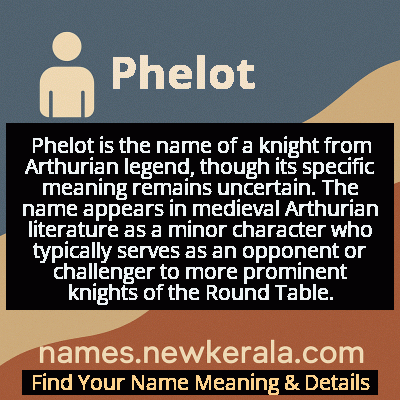Phelot Name Meaning & Details
Origin, Popularity, Numerology Analysis & Name Meaning of Phelot
Discover the origin, meaning, and cultural significance of the name PHELOT. Delve into its historical roots and explore the lasting impact it has had on communities and traditions.
Name
Phelot
Gender
Male
Origin
Arthurian
Lucky Number
4
Meaning of the Name - Phelot
Phelot is the name of a knight from Arthurian legend, though its specific meaning remains uncertain. The name appears in medieval Arthurian literature as a minor character who typically serves as an opponent or challenger to more prominent knights of the Round Table.
Phelot - Complete Numerology Analysis
Your Numerology Number
Based on Pythagorean Numerology System
Ruling Planet
Uranus (Rahu)
Positive Nature
Strong sense of order, loyal, practical, and disciplined.
Negative Traits
Stubborn, overly serious, rigid, and prone to feeling restricted.
Lucky Colours
Blue, gray.
Lucky Days
Saturday.
Lucky Stones
Blue sapphire.
Harmony Numbers
1, 7, 8.
Best Suited Professions
Managers, engineers, accountants, organizers.
What People Like About You
Dependability, discipline, practicality.
Famous People Named Phelot
Sir Phelot
Arthurian Knight
Appears in Thomas Malory's Le Morte d'Arthur as a knight defeated by Sir Lancelot
Phelot of Wales
Legendary Warrior
Mentioned in Welsh Arthurian traditions as a minor knight in Arthur's court
Lord Phelot
Nobleman
Featured in various medieval romances as a castle lord who challenges Arthur's knights
Name Variations & International Equivalents
Click on blue names to explore their detailed meanings. Gray names with will be available soon.
Cultural & Historical Significance
The character typically appears as an antagonist or challenger who tests the prowess and virtue of more central heroes, thereby reinforcing the chivalric ideals that form the core of Arthurian tradition. As a minor but recurring figure, Phelot contributes to the sense of a fully-realized medieval society within the Arthurian canon, where even secondary characters help define the moral and social landscape of the Round Table's golden age. His presence underscores the idea that Arthur's court was composed of numerous knights, each with their own stories and roles in maintaining the kingdom's glory.
Extended Personality Analysis
Individuals bearing the name Phelot are often characterized by a strong sense of independence and determination. Drawing from the Arthurian tradition where knights needed both physical prowess and strategic thinking, Phelot suggests someone with analytical capabilities and the courage to face challenges directly. There's an underlying current of ambition and competitive spirit, tempered by a sense of honor that prevents crossing into true villainy.
The name carries connotations of someone who may test boundaries and challenge established norms, but ultimately operates within a personal code of ethics. This creates a complex personality profile—someone who might initially appear as an obstacle or rival, but who possesses depth and principles that emerge through interaction and conflict. The Arthurian context suggests a person who values their reputation and standing, yet remains open to growth and redemption when confronted with greater virtues. Such individuals often display resilience and the ability to learn from defeat, making them formidable in their own right while respecting those who prove themselves superior.
Modern Usage & Popularity
In contemporary times, Phelot remains an exceptionally rare given name, primarily used by enthusiasts of Arthurian literature or parents seeking unique medieval names. Its usage is almost exclusively limited to English-speaking countries, with occasional appearances in fantasy literature circles. The name has never ranked in official baby name statistics, maintaining its status as a distinctive choice for those wanting to reference Arthurian tradition without using more common names like Arthur or Lancelot. Its rarity makes it appealing to parents seeking unique names with historical and literary connections, though its obscurity means it requires explanation in most social contexts.
Symbolic & Spiritual Meanings
Symbolically, Phelot represents the concept of the worthy opponent and the importance of challenges in personal growth. In Arthurian context, knights like Phelot serve as necessary obstacles that allow heroes to demonstrate their virtues and skills. The name carries connotations of testing and proving grounds—symbolizing how opposition can reveal true character and strength. It also represents the idea of the 'lesser knight' who, while not achieving legendary status, nonetheless contributes to the richness and complexity of the chivalric world. Metaphorically, Phelot suggests that even those who don't achieve fame still play crucial roles in larger narratives, embodying the principle that every character has significance in the grand tapestry of life.

